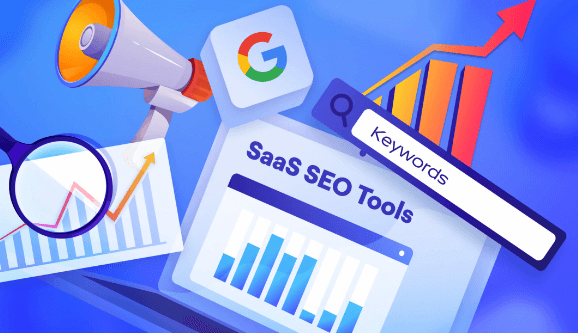Saas Seo Tools

Saas SEO tools have become an essential component for businesses seeking to improve their online presence and increase organic traffic. These tools offer a wide range of functionalities that help website owners optimize their websites, analyze competitors, track performance, and make data-driven decisions. By leveraging these tools, businesses can gain valuable insights into their online visibility, identify areas for improvement, and implement effective strategies to enhance their search engine rankings.
Keyword research and analysis is a fundamental aspect of SEO, enabling businesses to identify relevant keywords that align with their target audience’s search intent. Saas SEO tools provide advanced keyword research capabilities by analyzing search volume, competition level, and user behavior trends. This enables businesses to choose high-performing keywords that have the potential to drive more organic traffic. Read more
Competitor analysis is another crucial feature offered by saas SEO tools. These tools allow businesses to analyze their competitors’ websites in terms of keyword rankings, backlink profiles, content strategy, and overall online visibility. By gaining insights into competitor tactics and strategies, businesses can develop robust competitive strategies that enable them to outperform rivals in search engine rankings.
On-page optimization is a vital factor in improving website visibility on search engines. Saas SEO tools provide comprehensive on-page optimization features such as meta tag analysis, content recommendations based on keyword usage and density guidelines, URL structure suggestions, internal linking suggestions, and more. These features assist businesses in optimizing their web pages to meet the best practices recommended by search engines.
Backlink monitoring and analysis are essential for understanding the quality of external links pointing towards a website. Saas SEO tools offer backlink monitoring features that allow users to track new backlinks gained or lost over time. They also provide detailed analysis on anchor text distribution among backlinks which helps users identify any potentially harmful links or over-optimization issues.
Performance tracking is crucial for measuring the effectiveness of SEO efforts over time. Saas SEO tools offer various performance tracking features such as ranking tracking, organic traffic monitoring, and conversion tracking. These features enable businesses to track their progress, identify any fluctuations or trends in search engine rankings, and make data-driven decisions for further optimization.
Content optimization is a critical aspect of SEO that focuses on creating high-quality content that engages users and aligns with search engines’ ranking algorithms. Saas SEO tools provide content optimization recommendations by analyzing factors such as keyword usage, readability, duplicate content issues, and more. By implementing these recommendations, businesses can enhance the overall quality and relevance of their content.
Reporting and analytics are essential for measuring the performance of SEO efforts. Saas SEO tools provide reporting and analytics features that allow businesses to track key metrics, generate reports, and gain actionable insights. These features help businesses evaluate the success of their SEO strategies and make informed decisions for future optimization efforts.
Keyword Research and Analysis
Keyword research and analysis play a crucial role in search engine optimization (SEO), as they enable businesses to uncover valuable insights about user intent, competition, and market trends, facilitating informed decision-making for effective online visibility strategies.
By analyzing keyword trends and identifying popular long tail keywords, businesses can gain a deeper understanding of what their target audience is searching for and tailor their content to meet those needs.
This data-driven approach allows businesses to align their SEO efforts with the evolving demands of users, ensuring that their website ranks higher in search engine results pages (SERPs) and attracts relevant organic traffic.
Moreover, by identifying the keywords used by competitors, businesses can strategically position themselves in the market and capture a larger share of the online audience.
Overall, keyword research and analysis provide businesses with valuable insights that drive informed decision-making in developing successful SEO strategies for improved online visibility and increased organic traffic.
Competitor Analysis
An essential aspect of optimizing online presence is conducting competitor analysis. This allows businesses to gain valuable insights into their competitors’ strategies and identify potential opportunities for improvement.
Competitor analysis strategies play a crucial role in SEO as they help businesses understand the competitive landscape, identify industry trends, and discover keywords that their competitors are targeting.
By analyzing competitors’ backlink profiles, content strategies, and on-page optimization techniques, businesses can uncover new ideas and tactics to enhance their own SEO efforts.
Moreover, competitor analysis also helps in identifying gaps in the market where businesses can capitalize on untapped keywords or target specific audience segments that their competitors have overlooked.
Overall, by utilizing effective competitor analysis strategies, businesses can stay ahead of the competition, optimize their SEO efforts more effectively, and maximize their online visibility.
On-page Optimization
On-page optimization plays a crucial role in improving a website’s search engine visibility and user experience.
One key aspect of on-page optimization is optimizing meta tags and headings, which involves strategically placing relevant keywords to improve the website’s ranking for those specific terms.
Additionally, improving a website’s load time and ensuring mobile-friendliness are also important factors that contribute to better search engine rankings and overall user satisfaction.
Optimize your website’s meta tags and headings
Optimizing your website’s meta tags and headings plays a crucial role in enhancing its search engine visibility and improving user experience.
Optimizing meta tags for better search visibility involves strategically placing relevant keywords within the title tag, meta description, and meta keywords. These tags provide important information to search engines about the content of your web pages, helping them understand what your site is about and determining how it should be ranked in search results.
By including targeted keywords in these tags, you can increase the chances of your website appearing higher in search rankings when users enter related queries.
Creating effective headings is equally important as they not only help users navigate through your content but also capture their attention and encourage them to stay on your site longer. Headings should be clear, concise, and descriptive, using relevant keywords that accurately reflect the content beneath them.
By optimizing both meta tags and headings, you can improve your website’s visibility on search engines, attract more organic traffic, and provide a better user experience overall.
Improve your website’s load time and mobile-friendliness
Enhancing website performance and user experience can be achieved by improving load time and ensuring mobile-friendliness. When it comes to website load time, studies have shown that a slow-loading website can lead to high bounce rates and decreased user satisfaction. To improve load time, optimizing images, minifying code, and leveraging browser caching are effective strategies. Additionally, ensuring mobile-friendliness is crucial in today’s digital landscape where a significant portion of internet users access websites via mobile devices. This involves responsive web design, which allows the website to adapt seamlessly to different screen sizes and resolutions. By prioritizing these aspects of website design, businesses can not only increase user engagement but also boost their search engine rankings as site speed is a ranking factor for search engines like Google. Furthermore, improving website security should also be a priority as cyber threats continue to evolve. Implementing SSL certificates, using strong passwords, conducting regular security audits are some measures that can help safeguard against potential attacks. Overall, by focusing on improving load time and mobile-friendliness while also increasing website security measures, businesses can create an optimal online experience for their users while achieving better visibility in search engine results pages (SERPs).
Backlink Monitoring and Analysis
Backlink monitoring and analysis is an essential aspect of search engine optimization, allowing users to visualize the quality and quantity of backlinks pointing to their website. This process plays a crucial role in evaluating the effectiveness of backlink building strategies and link outreach campaigns.
By closely examining the backlinks acquired, website owners can assess the relevance and authority of these links, ensuring they align with their target keywords and industry niche. Additionally, monitoring backlinks helps identify any negative SEO tactics or spammy links that may be harming search rankings.
Armed with this information, website owners can make informed decisions on improving their link profile, disavowing harmful links, and developing effective strategies for acquiring high-quality backlinks from authoritative websites.
Performance Tracking
Performance tracking is a crucial aspect in monitoring the success of a website.
By tracking your website’s search engine rankings, you can evaluate the effectiveness of your SEO strategies and identify areas for improvement.
Additionally, monitoring your website’s organic traffic and conversion rates allows you to measure the impact of your marketing efforts and make data-driven decisions to optimize performance.
Track your website’s search engine rankings
One crucial aspect of monitoring the effectiveness of your website’s optimization strategy is tracking its search engine rankings. By regularly checking where your website ranks in search engine results pages (SERPs), you can assess the impact of your SEO efforts and make informed decisions to improve your visibility and organic traffic. To track your website’s search engine rankings, you can utilize various SaaS SEO tools that provide comprehensive insights into keyword rankings, competitor analysis, and historical data. These tools enable you to monitor changes in ranking positions over time, identify potential opportunities for improvement, and optimize your content based on SEO best practices and website ranking factors. Additionally, they allow you to analyze the performance of specific keywords or phrases, understand which pages are driving traffic from search engines, and adjust your optimization strategy accordingly. In order to better comprehend the significance of tracking search engine rankings, consider the following table showcasing a hypothetical example:
| Keyword | Current Rank | Previous Rank | Change |
|---|---|---|---|
| Saas tools | 3 | 5 | +2 |
| SEO software | 2 | 1 | -1 |
| Keyword research | 8 | 9 | -1 |
| On-page optimization | 15 | 14 | -1 |
| Backlink building | 20 | 21 | -1 |
This table clearly illustrates how tracking search engine rankings can reveal fluctuations in position and highlight areas that require attention. By analyzing such data-driven insights provided by SaaS SEO tools, you can continuously refine and adapt your optimization strategy to maintain or enhance your website’s ranking performance.
Monitor your website’s organic traffic and conversion rates
To assess the effectiveness of your website’s optimization strategy, it is crucial to monitor and analyze the organic traffic and conversion rates. These metrics provide valuable insights into the performance of your website in attracting and converting visitors.
By analyzing organic traffic, you can determine how well your website ranks in search engine results pages (SERPs) and identify opportunities to improve website usability and increase visibility. Conversion rates, on the other hand, allow you to evaluate how successful your website is at turning visitors into customers or subscribers. Learn more
By tracking these metrics, you can identify patterns in user behavior, understand what motivates users to take action on your site, and make data-driven decisions to optimize conversions. Monitoring organic traffic and conversion rates provides a comprehensive view of your website’s performance, allowing you to continually refine your SEO strategy for maximum effectiveness.
Content Optimization
Content optimization is a crucial aspect of SEO that aims to improve the visibility and ranking of a website on search engine result pages.
By optimizing your website’s content, you can ensure that it aligns with relevant keywords and meets the criteria set by search engines for higher rankings.
Additionally, creating engaging and informative content tailored to your target audience helps in attracting and retaining visitors, ultimately leading to increased traffic and conversions.
Optimize your website’s content for SEO
Optimizing a website’s content for SEO requires implementing strategic techniques to enhance its visibility and ranking on search engine results pages. To achieve this, it is crucial to focus on various aspects such as website design and link building.
When it comes to website design, ensuring that the site is user-friendly, responsive, and easily navigable can greatly impact its SEO performance. Additionally, incorporating relevant keywords in the meta tags, headings, and content itself can help search engines understand the context of the website’s content better.
As for link building, acquiring high-quality backlinks from reputable websites can significantly improve a website’s authority and credibility in the eyes of search engines. Furthermore, optimizing anchor text with relevant keywords in internal and external links can also contribute to better SEO rankings.
By employing these strategies effectively, websites can increase their chances of ranking higher on search engine result pages (SERPs) and attracting organic traffic.
Create engaging and informative content for your target audience
Engaging and informative content is crucial for capturing the attention and interest of your target audience. Utilizing engaging storytelling techniques can help create a connection with your readers, leading to increased user engagement and a higher likelihood of sharing your content.
By incorporating narratives, anecdotes, or case studies into your writing, you can make it more relatable and memorable. Additionally, focusing on user experience optimization is essential to keep readers engaged. This involves creating a seamless reading experience by using headings, subheadings, bullet points, and visuals to break up text and make it easier to consume.
Furthermore, optimizing the structure of your content for search engines through keyword research and placement can improve its visibility in search results and attract organic traffic. By combining engaging storytelling with user experience optimization strategies, you can create compelling content that resonates with your target audience while also driving organic search traffic to your website.
Reporting and Analytics
Reporting and analytics play a crucial role in evaluating the performance of SaaS SEO tools, enabling objective assessment of key metrics and facilitating data-driven decision making.
To ensure reporting accuracy, these tools employ advanced algorithms that analyze large volumes of data to provide insights into website traffic, keyword rankings, backlink profiles, and conversion rates.
Data visualization is another important feature offered by SaaS SEO tools, allowing users to easily interpret complex datasets through visually appealing charts, graphs, and dashboards. This empowers businesses to identify trends, patterns, and opportunities for optimization more effectively. Read more
With accurate reporting and intuitive data visualization capabilities at their disposal, businesses can make informed decisions based on real-time data analysis to improve their SEO strategies and achieve better search engine rankings.
Frequently Asked Questions
How do saas SEO tools help in improving organic search rankings?
Using saas SEO tools can have a significant impact on website traffic by improving organic search rankings. These tools provide benefits for long-term organic growth, such as keyword optimization and data analysis, ultimately leading to increased visibility and higher click-through rates.
Can saas SEO tools provide insights into the keyword difficulty and search volume for specific keywords?
Keyword research techniques are crucial for understanding the difficulty and search volume of specific keywords. Analyzing search volume helps in identifying popular keywords, while keyword difficulty analysis determines the competitiveness of ranking for those keywords.
Are competitor analysis features available in saas SEO tools?
Competitor analysis features in SEO tools enable users to conduct thorough competitor research, utilizing various methods such as backlink analysis, keyword analysis, and SERP ranking. These features provide valuable insights for businesses aiming to outperform their competitors in the online marketplace.
Do saas SEO tools offer suggestions for on-page optimization, such as meta tags and header optimization?
On-page optimization suggestions, including meta tags and header optimization, are valuable for improving organic search rankings. By analyzing keyword difficulty, search volume, competitor analysis, backlink tracking, and analyzing backlink quality, saas seo tools can provide data-driven insights to enhance website performance.
Is it possible to track backlinks and analyze their quality with saas SEO tools?
Backlink tracking and analysis are essential components of SEO. By monitoring backlinks, one can assess their quality and impact on website rankings. Analyzing factors like domain authority, anchor text diversity, and link relevancy helps optimize backlink strategies for improved organic visibility.
Conclusion
In conclusion, Saas SEO tools offer a range of functionalities that can greatly benefit businesses in their digital marketing efforts.
The keyword research and analysis feature allows users to identify relevant keywords and optimize their content accordingly, improving their chances of ranking higher in search engine results pages.
Competitor analysis provides valuable insights into competitors’ strategies, enabling businesses to adjust their own approach and gain a competitive edge.
On-page optimization tools help businesses optimize various elements on their website, such as meta tags, headings, and URLs, ensuring they are well-optimized for search engines.
Backlink monitoring and analysis allow users to track the quality and quantity of backlinks pointing to their website, helping them understand the impact of these links on search engine rankings.
Performance tracking features provide users with data-driven insights into the performance of their website, allowing them to make informed decisions about improvements.
Content optimization tools assist businesses in creating high-quality content that is both engaging for users and optimized for search engines. By analyzing various metrics such as readability scores and keyword density, these tools ensure that content meets both user needs and search engine requirements.
Finally, reporting and analytics features provide comprehensive reports on various SEO metrics such as organic traffic, keyword rankings, and backlink profiles. These data-driven insights enable businesses to continuously monitor and improve their SEO strategies.
In summary, Saas SEO tools offer an array of features designed to enhance businesses’ online visibility through effective search engine optimization techniques. With functionalities ranging from keyword research and competitor analysis to on-page optimization and performance tracking, these tools empower businesses to stay ahead in the highly competitive digital landscape. By leveraging data-driven insights provided by these tools, businesses can make informed decisions about optimizing their websites for better search engine rankings while delivering high-quality content that resonates with users.




